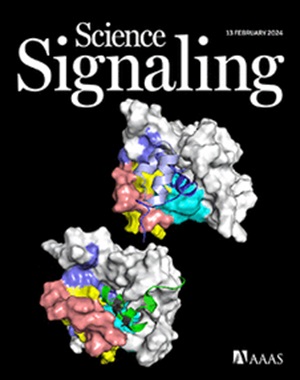DCLK1 induces a pro-tumorigenic phenotype to drive gastric cancer progression
IF 6.7
1区 生物学
Q1 BIOCHEMISTRY & MOLECULAR BIOLOGY
引用次数: 0
Abstract
Doublecortin-like kinase 1 (DCLK1) is a proposed driver of gastric cancer (GC) that phosphorylates serine and threonine residues. Here, we showed that the kinase activity of DCLK1 orchestrated cancer cell–intrinsic and–extrinsic processes that led to pro-invasive and pro-metastatic reprogramming of GC cells. Inhibition of the kinase activity of DCLK1 reduced the growth of subcutaneous xenograft tumors formed from MKN1 human gastric carcinoma cells in mice and decreased the abundance of the stromal markers α-Sma, vimentin, and collagen. Similar effects were seen in mice with xenograft tumors formed from MKN1 cells expressing a kinase-inactive DCLK1 mutant (MKN1D511N). MKN1D511N cells also had reduced in vitro migratory potential and stemness compared with control cells. Mice orthotopically grafted with MKN1 cells overexpressing DCLK1 (MKN1DCLK1) showed increased invasiveness and had a greater incidence of lung metastases compared with those grafted with control MKN1 cells. Mechanistically, we showed that the chemokine CXCL12 acted downstream of DCLK1 in cultured MKN1 cells and in mice subcutaneously implanted with gastric tumors formed by MKN1DCLK1 cells. Moreover, inhibition of the kinase activity of DCLK1 or the expression of DCLK1D511N reversed the pro-tumorigenic and pro-metastatic phenotype. Together, this study establishes DCLK1 as a broadly acting and potentially targetable promoter of GC.
DCLK1 诱导促肿瘤表型,推动胃癌进展
双皮质素样激酶 1(DCLK1)是胃癌(GC)的一种拟驱动因子,它能使丝氨酸和苏氨酸残基磷酸化。在这里,我们发现 DCLK1 的激酶活性协调了癌细胞的内在和外在过程,导致 GC 细胞的促侵袭和促转移重编程。抑制 DCLK1 的激酶活性可减少由 MKN1 人胃癌细胞形成的小鼠皮下异种移植瘤的生长,并降低基质标志物 α-Sma、波形蛋白和胶原蛋白的丰度。由表达激酶活性缺失的 DCLK1 突变体(MKN1D511N)的 MKN1 细胞形成的异种移植肿瘤也对小鼠产生了类似的影响。与对照细胞相比,MKN1D511N细胞的体外迁移潜力和干性也有所降低。与接种对照组MKN1细胞的小鼠相比,接种过表达DCLK1的MKN1细胞(MKN1DCLK1)的小鼠侵袭性更强,肺转移的发生率更高。从机理上讲,我们发现趋化因子 CXCL12 在培养的 MKN1 细胞和皮下植入由 MKN1DCLK1 细胞形成的胃肿瘤的小鼠中作用于 DCLK1 的下游。此外,抑制 DCLK1 的激酶活性或表达 DCLK1D511N 可逆转促肿瘤和促转移表型。总之,这项研究确定了 DCLK1 是一种作用广泛且可能成为靶点的 GC 启动子。
本文章由计算机程序翻译,如有差异,请以英文原文为准。
求助全文
约1分钟内获得全文
求助全文
来源期刊

Science Signaling
BIOCHEMISTRY & MOLECULAR BIOLOGY-CELL BIOLOGY
CiteScore
9.50
自引率
0.00%
发文量
148
审稿时长
3-8 weeks
期刊介绍:
"Science Signaling" is a reputable, peer-reviewed journal dedicated to the exploration of cell communication mechanisms, offering a comprehensive view of the intricate processes that govern cellular regulation. This journal, published weekly online by the American Association for the Advancement of Science (AAAS), is a go-to resource for the latest research in cell signaling and its various facets.
The journal's scope encompasses a broad range of topics, including the study of signaling networks, synthetic biology, systems biology, and the application of these findings in drug discovery. It also delves into the computational and modeling aspects of regulatory pathways, providing insights into how cells communicate and respond to their environment.
In addition to publishing full-length articles that report on groundbreaking research, "Science Signaling" also features reviews that synthesize current knowledge in the field, focus articles that highlight specific areas of interest, and editor-written highlights that draw attention to particularly significant studies. This mix of content ensures that the journal serves as a valuable resource for both researchers and professionals looking to stay abreast of the latest advancements in cell communication science.
 求助内容:
求助内容: 应助结果提醒方式:
应助结果提醒方式:


